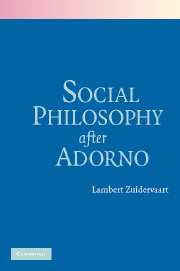Book contents
- Frontmatter
- Contents
- Preface
- Abbreviations
- Introduction: Thinking Otherwise
- 1 Transgression or Transformation
- 2 Metaphysics after Auschwitz
- 3 Heidegger and Adorno in Reverse
- 4 Globalizing Dialectic of Enlightenment
- 5 Autonomy Reconfigured
- 6 Ethical Turns
- Appendix: Adorno's Social Philosophy
- Bibliography
- Index
Appendix: Adorno's Social Philosophy
Published online by Cambridge University Press: 18 December 2009
- Frontmatter
- Contents
- Preface
- Abbreviations
- Introduction: Thinking Otherwise
- 1 Transgression or Transformation
- 2 Metaphysics after Auschwitz
- 3 Heidegger and Adorno in Reverse
- 4 Globalizing Dialectic of Enlightenment
- 5 Autonomy Reconfigured
- 6 Ethical Turns
- Appendix: Adorno's Social Philosophy
- Bibliography
- Index
Summary
Theodor W. Adorno was one of the most important philosophers and social critics in Germany after World War II. Although less well known among Anglophone philosophers than his contemporary Hans-Georg Gadamer, Adorno had even greater influence on scholars and intellectuals in postwar Germany. In the 1960s he was the most prominent challenger to both Sir Karl Popper's philosophy of science and Martin Heidegger's philosophy of existence. Jürgen Habermas, Germany's foremost social philosopher after 1970, was Adorno's student and assistant. The scope of Adorno's influence stems from the interdisciplinary character of his research and of the Frankfurt School to which he belonged. It also stems from the thoroughness with which he examined Western philosophical traditions, especially from Kant onward, and the radicalness to his critique of contemporary Western society. He was a seminal social philosopher and a leading member of the first generation of Critical Theory.
Unreliable translations have hampered the reception of Adorno's published work in English-speaking countries. Since the 1990s, however, better translations have appeared, along with newly translated lectures and other posthumous works that are still being published. These materials not only facilitate an emerging assessment of his work in epistemology and ethics but also strengthen an already advanced reception of his work in aesthetics and cultural theory. In this appendix I provide a brief sketch of Adorno's biography, followed by a summary of central topics and writings in his social philosophy.
- Type
- Chapter
- Information
- Social Philosophy after Adorno , pp. 183 - 202Publisher: Cambridge University PressPrint publication year: 2007



